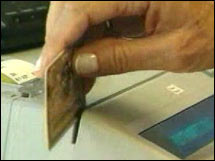The best and worst credit cardsMost major credit cards earned mediocre ratings, while cards issued by credit unions received the most kudos, a survey shows.NEW YORK (CNNMoney.com) -- When it comes to swiping plastic, consumers gave high ratings to American Express, Discover, as well as to cards issued by credit unions in a report released Thursday rating the best and worst credit cards. In a survey of more than 36,000 cardholders conducted by Consumer Reports, five of the largest MasterCard and Visa issuers, JPMorgan Chase (Charts, Fortune 500), Bank of America (Charts, Fortune 500), Citibank, Capital One (Charts, Fortune 500), and HSBC (Charts) - which together control about 80 percent of the market - earned mediocre rating scores.
The card issuer USAA Federal Savings, which scored 95 points out of a possible 100, earned the highest rating. The Navy Federal Credit Union and other credit unions followed suit with high scores. The top-three rated issuers charged interest rates between 9 percent and 11 percent. That's much lower than the two lowest-rated issuers, Direct Merchants (scoring 67 points) and Washington Mutual's Providian (earning 61 points), which both charge 17 percent. Even though the USAA Federal Savings card ranked the highest, it is limited to only members of the military, retired military personnel and their families.* Other credit unions, which also earned high scores on the list, also have limited membership, but recently many have loosened their policies and almost anyone can join the credit unions. "Credit unions are run by their members, so they are more likely to take care of you if you have a problem, and they are less likely to suddenly increase their interest rates," said Amanda Walker, senior editor at Consumer Reports. Consumers also said they were very satisfied with the two popular credit cards American Express and Discover, whose median interest rates are 14 and 15 percent. Two retailer-issued credit cards also scored well. Cabela's, which sells sporting equipment, and the upscale department store Nordstrom, both charged an average interest rate of 14 percent on their Visa cards, and have a long history of superior customer service, the survey said. Cardholders said that they had far fewer billing headaches and other problems with the card issuers at the top of the ratings. "It's more important than ever to have a card with a higher Consumer Reports rating because the lower-rated ones can cost you a lot due to their higher interest rates and fees," said Walker. Consumers who used the MasterCard and Visa bank cards - through JPMorgan Chase, Bank of America, Citibank, Capital One and HSBC - complained that they were assessed unfair late fees or experienced unexpected interest-rate increases. Providian had the worst rating for unexpected interest-rate hikes. Cardholders said their bills arrived too late for them to get their payments in on time, and they were more likely to be charged a late fee, even when they sent their payments a week before the due date. Twenty-eight percent of cardholders surveyed who pay the highest interest rates (interest of more than 25 percent) reported that their rate increase was due to a universal default clause. Cards that employ a universal default allow issuers to increase rates if a consumer makes late payments on other accounts, such as car loans, mortgages or other credit cards. The survey said penalty fees for late payments more than doubled in the last 12 years - from an average of $13 in 1995 to $28 this year. Some fees were even as high as $39. The survey also reported how well customers said issuers treated them when they needed assistance. USAA Federal Savings earned a top score. Credit unions, American Express and Discover were also highly rated. Overall, 27 percent of consumers who called customer support reported problems in getting help from representatives. The respondents reported unreasonable waits, difficulty navigating voice systems, or having to make multiple calls to speak to several staffers. *An earlier version of this story incorrectly referred to USAA Federal Savings as a credit union and said it had opened up its membership policy. CNNMoney.com regrets this error. |
|

